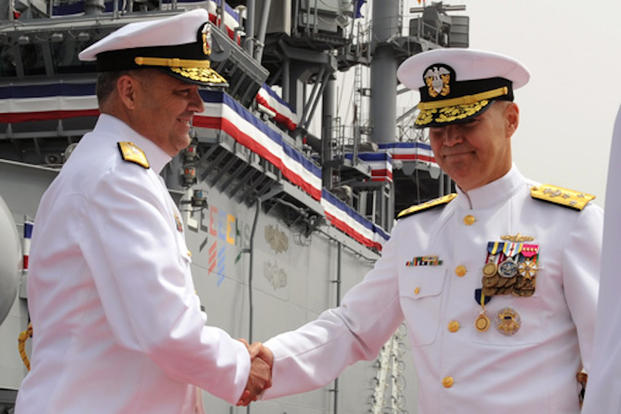Nathan Wertz is the editor of ThisAndThatTech.com.
Vice Admiral Richard Hunt, United States Navy (Ret), is the Vice President for U.S. Business Development at Raytheon, a major U.S. defense contractor. Over the span of his 37-year military career, Rick served in many high-profile positions, including: Commander of the U.S. Third Fleet, Commander of the Combined Joint Task Force-Horn of Africa, Commander of Carrier Strike Group Six, Commander of Naval Surface Force for the U.S. Pacific Fleet, and the Director of Navy Staff.
Rick shares his insights with us about his own military transition, working at Raytheon, and Raytheon's $5 million dollar multiyear partnership with the Student Veterans of America (SVA), which focuses on veteran education and employment.
[NOTE: Since we conducted this interview, Rick has become the Chief Strategy Officer at Fincantieri Marinette Marine].
Can you tell us a little bit about your background?
Sure. I grew up in Madison, Wisconsin, not too far away from the campus, the University of Wisconsin, so diehard Badger through and through.
That hurts me. I'm a Michigan fan, but okay.
Oh, goodness. My wife is an Ohio State grad, so that makes it even better.
That's even worse for me...
Sort of a liberal background, I think, just because of the city that I grew up in. Great high school, very much enjoyed that part of Wisconsin. Most of the relatives are farmers in the rural area of the state and, I'd say, kind of middle class background, as we grew up.
What was your catalyst for entering the military?
My dad was a disabled veteran from World War II. He was in the Navy. I think I'd always heard those kinds of discussions and stories of his experiences and I was kind of interested in doing that. The fact that he was a disabled veteran allowed me to go to college on the GI Bill. And so when I finished school I looked at GI, sort of owed something back to the country. This has been a terrific experience. Graduated from the University of Wisconsin in Madison and I looked to joining the Navy through the Officer Candidate Program.
Actually, it was while I was a senior at one of the job fairs. Navy folks were there and I had a chance to interact with one of the lieutenants that was there at the Navy booth. I found that pretty interesting. So, applied to go to Officer Candidate School, got accepted to Officer Candidate School for the Navy, which was in Newport, Rhode Island.
And enjoyed it, figured I'd be in for four years or so, kind of a payback for four years of college. Found I fell in love with Navy life, with the experience, the world travel, all the equipment that we got to use and operate. And first, at the top of the list, I would say truly enjoyed the comradery of shipmates, sailors at sea doing a common mission. I ended up staying for 37 years.
So I had a chance to go through the surface warfare community: served on frigates, destroyers, cruisers, aircraft carriers, commanded at a variety of different levels, to include Third Fleet towards the end of my career. And enjoyed, I'll say, almost every day. The one thing that I did enjoy was the interaction with our sailors and other servicemembers throughout that entire career. Just a fantastic opportunity, one that I've always really been thankful for having.
Any lessons from your time in service that have stuck with you?
I think one of the big things is how important it is to learn about individuals, understand their motivations, their concerns. And I would take that from a very personal level, one on one, and expand that to folks from different cultures and backgrounds from around the world.
One of the opportunities that I did have as a flag officer was to be the commander in Djibouti for Combined Joint Task Force Horn of Africa. Kind of a unique thing for a naval officer to do; we're traditionally at sea with a certain degree of separation. Being the Commander on the ground working with a combined force, so it was multinational, but also with our soldiers and Marines, Special Operation Forces, gave me a different appreciation to just how much influence, in a very positive way, we could exert with our allies and folks thinking about becoming our allies.
And that was something that I think I had experience with in my sea duty as we went around and made fort visits globally, but it wasn't really until I was able to develop some of the relationships at a pretty high level with different countries and different cultures and backgrounds that I really grew to appreciate just how enriching diversity of opinion and diversity of background can be as we make decisions.
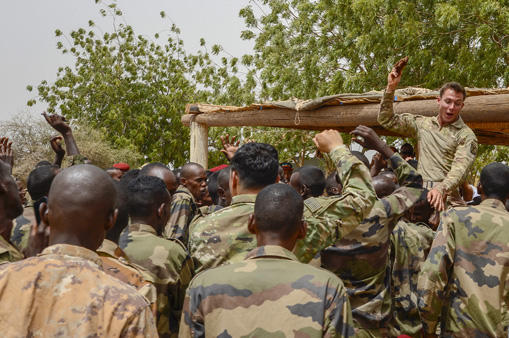
What was your path from exiting military service to your current position?
Well, it was interesting. I finished in my last job as Director of Navy Staff. I had previously been in San Diego at Third Fleet and at Naval Surface Forces, being both an Operational Commander and being in charge of Man, Train and Equip functions for the Navy Surface Force. Came back to D.C. and got to run the Navy staff working directly for the Chief of Naval Operations. Gave me great insight, continued to build upon my experiences, and I saw an awful lot of things across the Pentagon that perhaps I hadn't been exposed to in the past.
When I retired, I actually took a break of, I guess about three or four months or so, went down to Florida where we purchased a house when I was a lieutenant many years before. Did some work on the house and I felt that the piece that I was missing was that aspect of continuing to serve. It just so happened that Raytheon was reaching out looking for a business development person in the Navy/Marine Corps area and I applied for that job. The fit was great, the culture blended very, very well with my experience and the values that I found in Raytheon, that I knew before as a surface warfare officer.
Almost all the weapon systems that you have on our Navy surface ships are made by Raytheon, so I've been an end user. The opportunity to participate on the other side of that and contribute to that team doing some of the crosswalk between the Navy and the Marine Corps, customer and the engineers that do the design work, development, and manufacturing of the products that support those sailors was very satisfying to me. I was able to continue to advance some of the key areas that I was very interested in as I transitioned from the Navy, continued to work in directed-energy, cyber, undersea, some of those kind of areas that I felt needed continual technical advancement.
And the fit turned out very, very well. So great time, great engineers, working with a professional team on par with that I experienced in my previous Navy life was very personally rewarding, satisfying, and I think I found a place where I could contribute in a very meaningful way, not only to Raytheon as the company, but continuing to serve on the uniform side, providing those capabilities for our sailors.
What are some specific Raytheon products that people would be familiar with?
After being here for a little over a year, I was able to fleet up to the domestic side of business development for Raytheon. And in that role, I got the responsibility for all the services and some of the inner agency aspects, intel space, homeland security, FAA, some of those areas.
And so Patriot is a great example, that would be one. Our Standard Missile Series, SM-2, 3, and 6's, ESM, RAM, all the missiles that go off our surface ships. Tomahawk being a franchise program, all those are Raytheon products and very good.
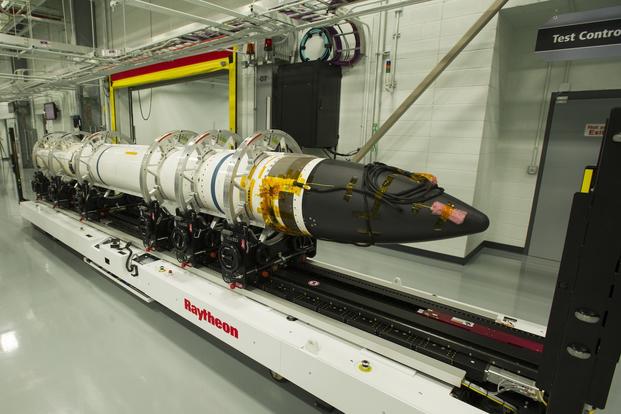
We had recently won AMDR (Air and Missile Defense Radar), which is the next generation radar for surface ships that will replace the SPY-1 of an earlier day, enhancing the capability tremendously. Next Generation Jammer and the electronic warfare capability to go on our Growlers. Supporting the fleet and land activities is another area that I think we're making a very strong contribution.
And we do an awful lot of classified programs in space and, most notably, in the cyber domain. Across the board, a combination of offense and defense, cyber resilience, greatly improving and enhancing both equipment sets and cyber defensive networks.
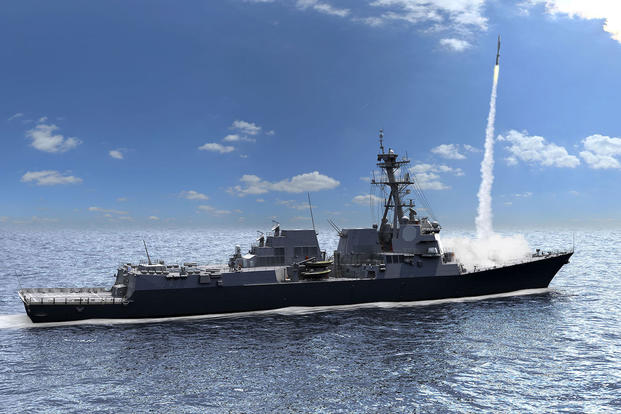
In my research on Raytheon, I came across the mention of 3DELRR (Three-Dimensional Expeditionary Long-Range Radar), a next generation long-range radar system. This was a contract that went to Raytheon and then it was protested in 2014 by competitors, Lockheed Martin and Northrop Grumman. Can you give us a thousand-foot view on how the industry competition works?
We as a nation do a very effective job of competing with almost all the products. And that's an example of one where, unfortunately, Raytheon did lose [Raytheon has subsequently been awarded this contract at time of publication] . But in most instances for those kind of systems, I would say it's generally a competition of three or four of the major defense industry partners out there that are competing for different products. We've got a pretty good success rate here at Raytheon, certainly over the last decade or so, and that was one that went the other way.
Back to your transition. How did you feel the day you left military service?
Certainly people that make a career out of any of our armed services, when you leave it's kind of a sad day. I mean that's what I think most servicemembers devote their life to doing and do so very proudly. It's just filled with comradery, satisfaction of mission accomplishment across the board. Given the opportunity to serve, given the opportunity, in my case, to go back at sea and serve, would be something I would do in a minute.
It just becomes kind of a time thing. At certain points I think I contributed to the extent that I could and it was time to move on at that point. And I look back on my service very fondly and with a great deal of pride, as I know all of our other servicemembers do, in the accomplishments that we've had over the last several decades.
Do you feel the military has helped or hindered you in the job market?
I think, not only myself, but one of the things that I've tried to do throughout my career, and I have the opportunity to continue to do this, is to mentor and advise folks as they do the transition. I think that's something that we, in uniform, all take very seriously. And in some cases post-service, we have the opportunity to continue to do that.
So I think it was an easy transition for me, again, because this is very straightforward. The products that I've used are the products that we are involved in manufacturing. Many of the folks that work as part of my team, in fact the vast majority, have a very strong military background. The culture of Raytheon, the values of Raytheon, is very similar to that, that I experienced in my Navy life. So that all helped.
You know I think values is probably at the top of everybody's list. But a combination of the values and fit, feeling accomplishment in what you're actually producing, has made for, I would say, a pretty straightforward transition.
There are certainly differences between the military life and the civilian life. You have to learn new acronyms, new terminology, but the vast majority of the skills that we have learned, I think, translate well and would translate well for most folks coming from the uniform into a defense industry/aerospace industry kind of organization.
Let's talk about mentoring veterans in the corporate realm. What is something you've learned or noticed from doing that over the years?
I think an awful lot of folks in uniform take a look at working for the defense industry as one of those key options. So I would tell you that be it at job fairs or interactions on military bases, there has always been a very strong presence by the defense industry. Talking to those guys, getting an understanding and appreciation is very, very useful. I actually encouraged it while I was on active duty. Some people go, oh, man, people think it's better on the other side. We could end up losing really good people.
What I found was many of our servicemembers were comforted by the fact that there was industry out there waiting to use them when the time occurred. And it gave them comfort to stay in and remain on active duty, to continue to have that job satisfaction that they get from being in the service, knowing that there were plenty of opportunities when the time came and they actually did the transition.
We do an awful lot of mentoring here. The fact that we are a customer-faced base as a business development organization, means we're out and about talking to folks all the time. And my group of folks that I work with, myself included, actively offer recommendations to folks, I think in a very objective and neutral manner, to anybody that asks.
Virtually everybody that I've worked with, doesn't matter what company that they're in, I think feels strongly like I do, that it's very important to help folks transition. And frankly, we find great personal satisfaction in being able to give advice. So I'm fortunate that I could do that from this position and maybe give a little more insight than some others may not be able to do.
Why do you think some veterans struggle when they first transition? How does it relate to the corporate realm? Can you talk a little bit about that?
So I would tell you that it takes a little bit of time, effort, and work to find that organization that you want to continue your next phase in and feel a great deal of satisfaction. And that's why I say starting the transition process, thinking about where you're going earlier, and kind of poking into a whole variety of different opportunities makes an awful lot of sense. People will tell you, don't rush into a first job. Others will say, most folks getting out of the military will go through two or three different ones in the first five years. I would offer that that may happen, but you can cut down on that a lot if you kind of do your research ahead of time.
You talk to people in the business that are working, you research the company, perhaps you've interacted with those companies, like I indicated that I had with Raytheon in my Navy life. I think if you do that, you can really put yourself on a different path, as opposed to, "My end of active duty time is up next month and, oops, I better start looking for a job."
And with most of our servicemembers having family responsibilities at some point, they can often get put in a position where they need to make a decision on getting a job for the job's sake to take care of family, before they're able to navigate, find, and work through the employment process to get to where they ultimately want to be.
You know of interest to me, I would tell you that I think in some of the larger companies like Raytheon and across the defense industry, it probably takes more time than most folks think to go through the interview process, acceptance, kind of the vetting process that goes on by the companies. And if you're up against a timeline where maybe your terminal leave runs out and you've gotta take care of family, you can get pushed into a position that you don't want to be and maybe end up in a place that you might not have settled for, had you given yourself more time to go out and really explore the job opportunities.
Were there any moments that come to mind in your military career, as well as Raytheon, where your position significantly changed?
I certainly took some interesting changes in my military career, I think, very diverse. A lot of joint time, a lot of Pentagon time, operated off both coasts, served on aircraft carriers for a couple deployments, just about all the complete suite of different surface ships. I think the thing that stands out as an unusual piece was probably that tour on the ground as the Commander in Djibouti in Horn of Africa.
You know going into a command position in a pretty challenging part of the world without that ground experience. I found it a little bit intimidating at first, but when we go out there, the training package that comes with it, and the support that the Defense Department puts in place for those kind of transitions was very, very positive, and I think yielded a powerful result in the one year that I had over in Africa, in the mission.
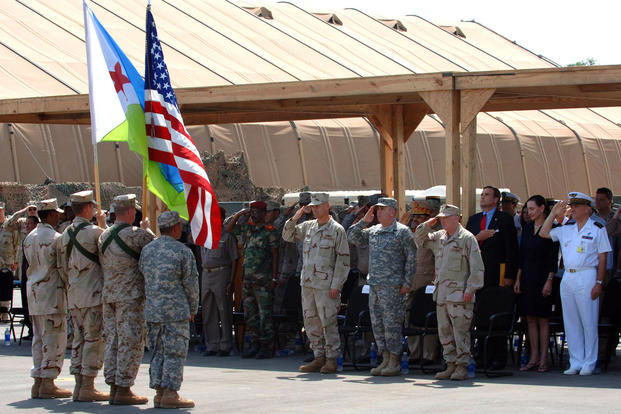
Rear Adm. Richard Hunt (from left), Army Gen. John Abizaid and Rear Adm. James Hart salute the colors during the Combined Joint Task Force - Horn of Africa change-of-command ceremony Feb. 14 at Camp Lemonier, Djibouti. General Abizaid officiated as Admiral Hunt passed command of the task force to Admiral Hart. (Photo Credit: U.S. Air Force photo/Tech. Sgt. Carrie Bernard)
So it's very interesting. I think in almost every position that I've had in uniform was one where due to the continual training, education, and development, I felt pretty comfortable moving up that ladder, all the way through my last tours. And that includes fleet command and positions like that. So that was very helpful.
In transitioning to Raytheon, I think it was really a matter of picking up on the nuances of what motivates companies to do business. What their focus is on, which is a little bit different than what you get in the military. I think that the bottom objective of producing the best capability possible to satisfy the solution sets, in this case, for a military or intelligence customer remains very similar.
So again, I would say, a few surprises, a couple of challenges where I needed to adjust and break away from what I'd been doing earlier. But my military experience, I think, set me up very, very well, not only throughout my career there, but for follow-on opportunities here at Raytheon.
Is it plausible to have work/life balance and how did you navigate that in the military with so much responsibility?
I probably get a C- on work balance and my wife may say the same. It's interesting, if you are passionate about what you do, that goes a long way to making up for the work balance. And if you have a spouse and family that supports you in your activities, maybe it just redefines work balance a little bit.
When I hear that term and I compare it to some of the courses and reading I've done on that, I may not score very high. When I think about personal and professional satisfaction, I think I'm right in the sweet spot of where I want to be. Not everybody may want to be in that position.
But I think one of the most important things and a piece of advice that I give to those transitioning is you really want to find fit with whatever you're doing, to be passionate about what you're doing, to feel like you're a valued contributor. And if you're fortunate enough to get that fix, and that takes you a little bit of study and effort to make sure you can achieve that, I think you become in a very good place that is very rewarding and beneficial not only to you personally, to your family, but also to the organization that you're working for.
Any books, podcasts, mentors that helped you along the way, that maybe you could recommend?
I would offer that most of my mentorship and interaction has really been from other people, as opposed to reading or listening or surfing the web. Maybe it's I'm just from that older generation, but I get great value from talking to folks and listening, active listening being critical to all that we do. And opening the aperture to get a different appreciation on how people approach problems.
So I'm afraid I can't give you the magic book or podcast or website to go to.
Military.com has many active duty and veteran readers that may want to someday work in your field. To get to where you're at today, what do you feel is the optimum path to travel? What would you recommend to people just starting out?
You come into a company like Raytheon or into the defense industry, being well-versed in those STEM areas is very important. So taking technical background, engineering, cyber, probably at the top of that list right now. And doing the very best that you can to expand your professional abilities in those areas is very, very important.
My advice to our servicemembers is start planning ahead early when you decide it's time to do that transition and I would sit down and spend a fair amount of time trying to assess what your ultimate goals are. Not getting out and getting a job right away, but where do you want to be 20, 30, 40 years down the road? And what does it take to get there? So figure out what you want to do, what are your goals in life, where you are right now, and what it takes in portfolio development to get there.
The GI Bill gives all of our servicemembers such a tremendous opportunity to fill in some of that professional portfolio in a very positive way. Going to pick up a college education, if you don't have that already, and working in some of those high-demand areas really can be lifechanging. So I strongly encourage people to take a look at doing that early, to get out and get mentors from diverse backgrounds with different experience and perspectives on life, talk to many different groups.
Student Veterans of America is key. Around the nation, they support our major military installations. Here you have people that have done exactly what I've just described and are very successful at it. They can be great mentors, offer terrific advice.
Organizations like that facilitate others. Raytheon certainly does it. I know our partners in the defense and aerospace industry contribute also, but mentors coming in from the industry to talk to people, to tell them what's important, how life is on the other side. Getting that perspective can be very, very helpful and useful. Starting that very early and broadening your goals, to make sure you set them really high and then figure out what the precise steps are to get there is important.
You're not gonna go for that grand slam right off the bat. So what does it take to position yourself in transition? What are the moves to advance so you can continue to really stretch and go to the ultimate goal? That would be a strong recommendation that I would have.
Let's talk about SVA. What's Raytheon's partnership with Student Veterans of America? What does that entail?
So we've been involved with SVA really since the beginning. And I think the premiere supporters, certainly we were at the national meeting in Los Angeles in early January. We feel a great passion to being able to help and participate. I think we had over 40 folks throughout the three-day event come out and mentor folks, to interact, and talk about opportunities with Raytheon and just discuss the defense industry, in general. I'm pretty sure we are committed to maintaining that relationship. We see great value in that.
I mentioned going after STEM degrees and being able to give back. I would tell you, being able to shape some of the folks maybe that are coming in as freshman, that have the opportunity to make a decision as to what that educational path would be, to put them in line for good, meaningful jobs down the road is something that Raytheon really wants to contribute to. We do that through our STEM programs at a younger level and we know that the college level is even closer to bringing some of these folks into our workforce and to see great value across the industry as a result.
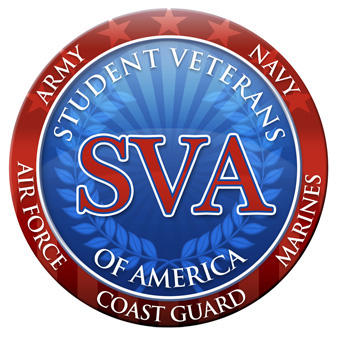
How many veterans are employed at Raytheon right now?
I think it's about 1 in 6 right now. I think we're, what, over 11,000 or so out of a 60,000+ workforce.
How did this opportunity come about, working with Student Veterans of America?
So the opportunity came up of going out and interacting with veterans. And so, as I said, that's something that I have done throughout my entire military career and continue to do here in this position. So when the opportunity came to go out and say a few words with the organization, to meet and talk to those guys, I jumped on that. And it was well worth my time to do that and very personally satisfying.
What are some of the programs and resources that the SVA offers that stick out to you?
I think it really goes to the mentorship. And again, helping many folks do that cross-walk between some pretty demanding combat experiences and setting them up to make the transition. Having folks you can talk to with regular gatherings in a very positive way is, in my mind, the most important thing that they do.
The SVA website shows an ongoing research study called NVEST (National Veteran Education Success Tracker), commissioned by the U.S. Department of Veterans Affairs and the National Student Clearinghouse in conjunction with the Student Veterans of America, detailing academic success of student veterans using the Post-9/11 GI Bill.
One of the fact sheets there shows a success rate of 72% for student veterans. When you compare that to the U.S. Department of Education, you see numbers around 59% for the general public. Why do you feel that it's much higher with veterans?
My experience, as I said, I went to university on the GI Bill with an awful lot of veterans coming out of the Vietnam era. And I would tell you, those Vietnam veterans were incredibly impressive. I think the focus that you get out of our veterans is they do the transition. They've learned a very strong work ethic, they've had strong values or goals put in front of them that they reach out to achieve.
If you were to say 72% success rate, that would not surprise me at all. Again, having looked at where we are right now with the quality of individual that comes into the United States military, this is the very best that we have in American youth. And I would expect three quarters of them to graduate and do a very good job.
I'll tell you when I was on active duty we did some work with the Cal State System across the board, where we kind of streamlined the process. This is active duty, Navy, Marines, and working with the Cal State folks, streamlined the admittance process. And those guys had success, right? These were people that were vetted by the chain of command as some of the best and brightest that were transitioning. And so we got them and expedited admittance to the university system there. And the success right there was just, and I don't have those facts and figures now, it's a little bit dated, but were at least the 72 percent that we're talking about.
Wow.
And so we've come to expect that out of our great men and women in service, just being successful in everything that they do. The fact that you've got an organization like SVA that helps in the mentorship, helps them do the transition, helps some of those folks that had challenges from their military service, many of the ground forces with the experiences that they went through, navigating that with like-minded folks, I think puts them very prominently in a position for success, which is one of the reasons why we think SVA is just so critical.
You get that mentorship and that continual engagement and it goes a long way to generating success. My guess is some of the lower numbers probably goes to maybe some of the not for profits and that sort of thing. When you get top-named schools like we're supporting here through SVA across the board, people are there for one thing, and that's to graduate and move on and make their life better than when they started. And they do a great job of doing that.
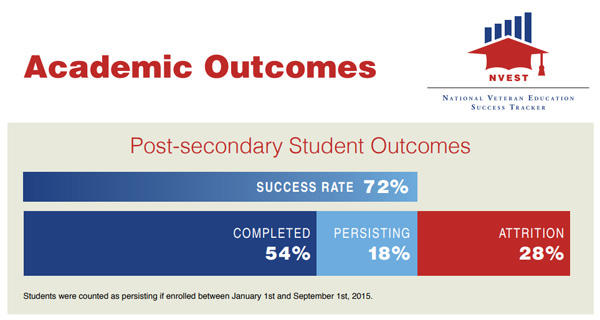
(Screenshot from NVEST Fact Sheet).
Can people actively serving integrate with Student Veterans of America?
Certainly people that are looking at transitions can become part of that. I think you can take advantage of their functions that they have. We were just out in Los Angeles. I think there was somewhere over 1,200 student veterans there. There were also some veterans, not as many, most of them were students, but they have organizational representation around where bases are as well as the universities. So I think there is great opportunity to cross-pollinate.
And that's getting in and encouraging folks, six or even more months out before they transition, to be thinking and understanding what the opportunities are, how I might pick a university to go to, and for what reason. An organization like SVA is just a really good place to go and to be able to utilize that experience.
So the all-encompassing question, why should vets consider joining the Students Veterans of America?
Again, I think it's for that support network. After I talked, I had three or four different folks come up and talk about different things. Some of it was just personal education, some of it was advancing support for TBI (Traumatic Brain Injury), Wounded Warrior kind of issues. There was one group that came up talking about suicide prevention, some of the challenges that they are experiencing. So it's pretty interesting that all these different things are incredibly important. And by having an organization like SVA be there to help address these issues as they come up is just a very positive avenue for support.
And it was great being able to get out there to talk to people, to get a feel for the type of folks there. This was kind of the leadership of the organization. And I'll tell you, the folks that I saw out there were just off the charts for passionate, energized, with many different experiences and backgrounds and things that they wanted to advance. The common thread was they were all leaders. So whether they worked for defense industry or they go work in the social services area or the medical area, they're gonna be successful.
And all of our service men and women have been on the greatest team in the world, the US military. Being able to continue to develop and to pass that kind of passion for being the best possible in whatever you do is something that I think takes continual reinforcement and you get it out of a group like SVA.
What's next for you at Raytheon and can you give us any kind of insider information?
[laughs] I could never give you insider information. That'll get me in deep trouble.
Well, I always throw it out there. I hope somebody slips, but nobody ever does...
Yeah. What I would say is that much like my military service, I just want to continue to work with and serve Raytheon. It is a terrific company with great values, most importantly making great products that keep our wonderful military safer and more able to achieve mission success. And being able to do that is as rewarding as when I was on active duty.
